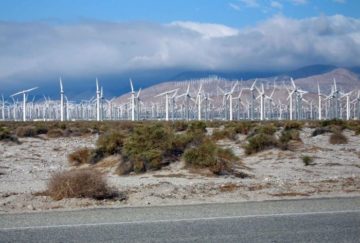 David McDermott Hughes in Boston Review:
David McDermott Hughes in Boston Review:
Renewable energy seems set to repeat many of the mistakes of fossil fuels. Though wind and solar power will not degrade the conditions for life on planet earth, the geography and corporate structure of these industries concentrate benefits and exclude communities in the style of Big Oil. The neighbors tend to notice—and to complain. So-called “renewable energy rebels” want a slice of revenues, or wind farms that are smaller or farther away. These “not-in-my-backyard” protests are delaying and blocking projects from Spain to Germany to the United States. To the extent that these movements succeed, they undercut the planet-saving ideal these technologies promised to all of us.
A Spanish village I will call Sereno, possibly the most turbine-surrounded community in the world, exemplifies this lesson. In 2006 residents rebelled against plans for hundreds of turbines to be installed only hundreds of meters from them. They anticipated ugly sights and sounds: ninety-meter steel towers and sixty-meter fiberglass blades bristling and pulsating above wheat and cattle. Their protest failed, but—alongside similar movements elsewhere and the economic crisis of southern Europe—it effectively slowed the construction of new turbines in the entire autonomous region of Andalusia. Meanwhile, the residents—with whom I shared many drinks while visiting as an anthropologist—nurse their old grudges and discover new ones: bird kill, the absence of jobs in turbine maintenance, lack of once-anticipated tourism jobs, and deals whereby landowners collect royalties from each wind turbine. Some of these problems can be solved: a wind commons, for example, would take power away from the handful of old families who control those wheat fields and pastures. The 800 landless residents of Sereno—many of whom are poor and technically squatters—might then collect revenue and support the energy transition. This is worth fighting for.
More here.
